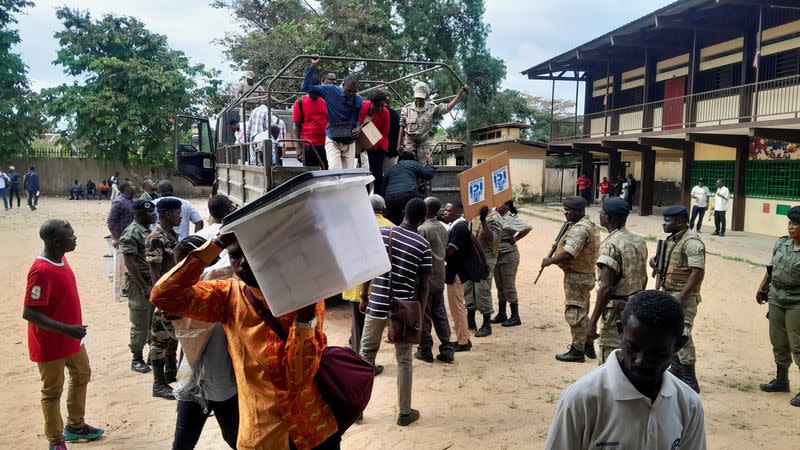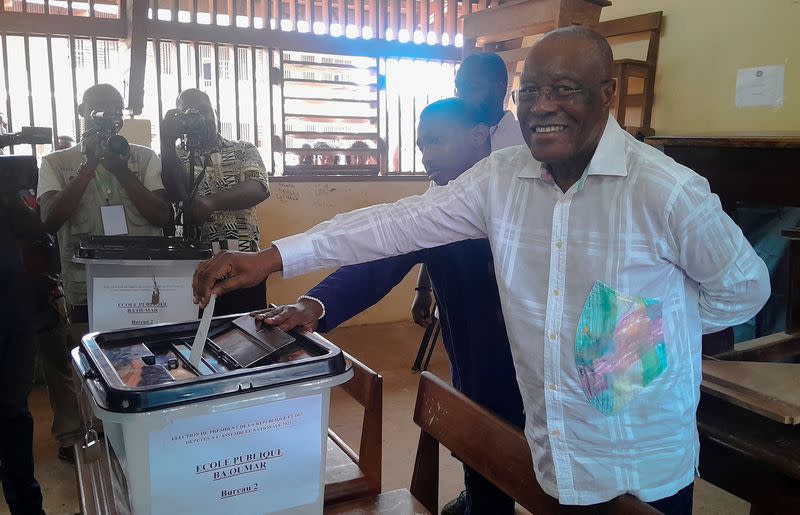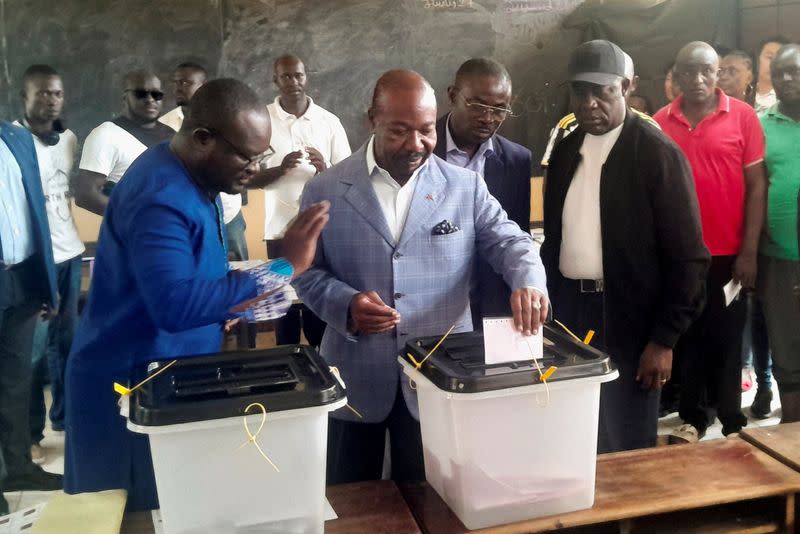Gabon cuts internet, imposes curfew amid election voting delays
By Gerauds Wilfried Obangome
LIBREVILLE (Reuters) -Gabon's government blocked internet access and imposed a curfew on Saturday after an election marked by major voting delays, as the opposition cried foul over a poll they hoped would halt President Ali Bongo's bid to extend his family's 56-year grip on power.
The Central African nation was holding presidential, legislative, and local polls simultaneously for the first time, with tensions running high amid fears electoral system changes could sow doubt about the legitimacy of the result and provoke unrest.
Bongo, 64, who succeeded his father Omar in 2009, is seeking a third term against 18 challengers, six of whom backed a joint nominee in an effort to narrow the race. Bongo's team rejected allegations of fraud.
Voting was due to start at 0700 GMT, but at least five polling stations in the capital Libreville saw voters waiting hours for polls to open, a Reuters reporter said.
"This election is very tense because I don't think a vote in our country has ever started so late," said voter Jeff Mbou at a polling station in Libreville's Martine Oulabou school, where voting started nearly four hours late.
It was not immediately clear how many areas were affected by the delays or if all voters were able to cast their votes. The election commission did not immediately reply to a request for comment.
Any irregularities will add to concerns about the post-electoral period, which in Gabon has previously seen violent protests linked to the opposition disputing the result.
There is no fixed deadline for the announcement of results, but joint opposition candidate Albert Ondo Ossa, 69, and his alliance on Saturday were already questioning the legitimacy of the outcome.
Citing the threat of online disinformation, the Gabonese government cut the internet until further notice and imposed a night-time curfew from Sunday "in order to prevent any misbehaviour and to preserve the security of the entire population", according to a statement read on national television on Saturday evening.
The Netblocks internet observatory confirmed that a nation-scale internet shutdown was in effect across Gabon - a move it said was "likely to severely limit the public's ability to communicate during the election period".
Gabon shut down internet access for several days in 2016 when violent street protests erupted against Bongo’s contested re-election for his second term that saw the parliament building torched.
FRAUD ALLEGATION
The vote is a much-anticipated test of support for Bongo, whose detractors say has done too little to funnel Gabon's oil wealth towards the third of its 2.3 million population living in poverty and question his fitness to govern after a stroke in 2018.
Bongo has sought to disprove this image on a wide-ranging campaign trail. He has promised to create more jobs, boost micro-loan programmes and cut public school fees.
"We are voting and we are winning," he said in an online post on Saturday, sharing a video of his supporters wearing T-shirts with his campaign slogan "Ali for Everyone".
The run-up to the election has been smooth, but many fear the post-election period could see turmoil like the 2016 protests. The opposition has disputed both his previous election wins, saying he won fraudulently.
"I am perfectly informed about the fraud orchestrated by Ali Bongo and his supporters," Ondo Ossa told reporters at the polling station at Ba Oumar High School, in Libreville, without detailing the exact allegations.
"Ali Bongo still has time to negotiate. The only negotiation that is necessary is his departure; 60 years in power is too much," he said.
In online posts, his opposition alliance Alternance 2023 and Bongo's spokesperson said some polling stations had not received ballot slips for their respective candidates. Reuters could not independently verify the comments.
"The vote hasn't even finished yet, and already the opposition is losing its nerve and its composure. This attempt to sow discord, because defeat is near, will not work," Bongo's campaign spokesperson Freddhy Koula said in an online post.
Recent changes to the voting system could further complicate the aftermath, said Remadji Hoinathy, a researcher at the Africa-focused Institute for Security Studies. These include the introduction of a ballot that requires voters to pick a presidential candidate and lawmaker from the same party.
The opposition has also voiced concern about a recent constitutional change to abolish two rounds of voting for the president.
Bongo's camp has positioned him as the firm favourite to win the race, although there has been no reliable polling.
His main threat comes from Ondo Ossa, an economics and management professor who has campaigned on the need for change and better economic opportunities.
The pitch could resonate in a country where one in three young people are unemployed and the vast majority of the population has only known Bongo's rule.
(Additional reporting and writing by Alessandra Prentice; Editing by David Gregorio, David Holmes and Mike Harrison)








